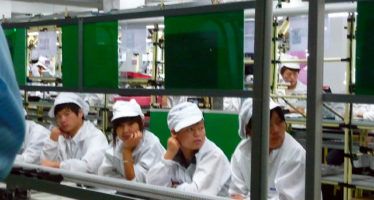CARB: The Gremlin in California’s garage
Dec. 11, 2012
By Katy Grimes
The California Air Resources Board’s first cap and trade auction in November is yet more proof that CARB is responsible for making people cough, snort and wheeze in California. While trying to convince everyone that the carbon credit auction was a success, CARB officials have blown more smog around the state than an oil-burning AMC Gremlin.
Mary Nichols, CARB’s director, refuses to talk about losing jobs and the painful state of the economy. And she’s getting away with it.
California’s radical global warming legislation
AB 32, the California’s Global Warming Solutions Act of 2006, was supposed to lower the state’s carbon emissions to 1990 levels by 2020. But since the legislation was passed, CARB has myopically insisted that Californians need to go on a carbon diet — despite evidence of fraud, refutations of the junk science behind AB 32, the exorbitant cost to the state’s economy, and no standard climate change measurements.
The state claims that it will accomplish lowering greenhouse gas levels by “capping” the carbon emissions of oil refineries, utilities and power generators and other manufacturing and industrial businesses.
However, in doing so, the agency also stubbornly has refused to answer why California should go it alone when the rest of the country, and most of the nations in the world, have pulled out of cap and trade, or were never participants in the first place.
It looks like what actually will be capped is production and productivity in the state.
Could cap and trade be the Gremlin driving the California economy off the cliff?
Faux impact
The carbon intensity of the United States is only one-quarter of China’s and is already well below the average of the world.
But the real result will be in the near future, as California’s unrealistically strict carbon emission rules will discourage in-state manufacturing and production, as businesses are financially penalized with the carbon tax.
Many climate scientists have reported that achieving zero carbon emissions from the United States will have no impact on future temperatures. This also applies to CARB’s cap and trade as well as AB 32.
If the goal is to reduce carbon emissions in order to stop global warming, taxing businesses accomplishes nothing of the sort.
But first, is there really dangerous global warming looming ahead?
Meteorologist debunks warming theory
“Not only are temperatures not increasing faster than was predicted 10 years ago, temperatures have not increased at all since the late 1990’s,” said Joe Bastardi, the Chief Long Range Forecaster at Accuweather for 32 years.
Bastardi, a meteorologist and now the Chief Forecaster at WeatherBELL, says that private companies make more accurate forecasts than the government.
Bastardi has been an outspoken skeptic of human-induced global warming.
“Furthermore, when you compare the observed temperatures of the past 10 years against all the climate model predictions, the result should do more than raise eyebrows about how much taxpayer money is being wasted on climate science that is proving to be wrong.”
The argument that global warming is causing more extreme weather is problematic, Bastardi said, “because it presumes the globe is warming.”
In a recent article, Bastardi explained:
“In fact, the global temperature trend line has been stable for more than a dozen years, while carbon dioxide has increased 7%. If CO2 was the driver, then why have global temperatures stopped increasing?
“Keep in mind that CO2 represents 0.0395 percent of the Earth’s atmosphere. Arguing that CO2 is driving the small temperature variations in our climate as opposed to the oceans, which cover 70 percent of the planet and have 1,000 times the heat capacity of air, or the output of our sun, is scientifically disturbing.
“Weather is more publicized nowadays because of its impact on society and the constant push of the global warming agenda. Increases in population result in more people being in the path of Mother Nature’s fury.”
Global Warming alarmists and activists
Bastardi asked:
“How do these people have any credibility? How do they get away with this? It’s mind boggling that it’s gotten to a point where the EPA is dictating policy based on what is an obvious fraud, or if you want to be gentle about it, creates enough doubt to back off.”
Bastardi said that if the U.S. is sincere about economic recovery, we need to “get rid of the EPA running roughshod over factory owners, and lower the corporate tax rate to below China’s (it is so hard to believe that Chinese tax rates are lower) and you will find that companies will stay here and pay a decent wage to build air conditioners. But not if you are clamping down on people based on questionable, don’t-have-a-leg-to-stand-on ideas about CO2 warming the planet.”
Bastardi goes on to explain, “Global warming activists attribute every major weather event to man because they are either uninformed about history, or choose to ignore it. They own every answer. It could snow cheese in New York tomorrow morning and that would be from global warming.
“All the Intergovernmental Panel on Climate Change projections for our climate have proved to be wrong. Global temperatures have stopped increasing and are nowhere near estimates made a decade ago. The IPCC incorrectly predicted Arctic sea ice would disappear by now.”
Faux goals
But don’t let the facts, data, and history get in the way of a revenue-producing, controlling government program.
Instead of actually reducing carbon emissions, in California a business can merely purchase get-out-of-jail carbon credits. But this nullifies the goals of AB 32.
Another problematic area is that AB 32 does not provide CARB the authority to withhold allowances from businesses to sell at auction for the benefit of the State. This taxing function was not included in the authorizing legislation and was never discussed at the committee hearings while the bill was progressing through the legislative process.
Interestingly, the legislative committee videos held during 2005 and 2006 have disappeared. The California Channel, the official videographer of the California Legislature, recently pulled all videos prior to 2009. I have made several written requests and phone calls to the California Channel for access to these videos, but have never received a response.
Additionally, the Legislative Analyst’s Office, and many others, have concluded that an auction is not necessary to reach the greenhouse gas emission reduction goals in AB 32.
Flaws and faux reporting
The AB 32 Implementation Group, comprised of employers and taxpayer groups concerned about protecting jobs and the California economy, while implementing the state’s policies to meet AB 32 goals, has been trying to deal with CARB since implementation began. The group’s members acknowledge that AB 32 is law, and have tried to work with CARB to reasonably implement the law.
“CARB announced, prior to the November auction, significant changes would be made to the allowance obligations of certain entities in 2013 and unspecified changes to adjust the assistance factor for energy-intensive trade-exposed industries for the allocation rules in 2015 and beyond,” the AB 32 Implementation Group reported last week.
“This unfinished work creates uncertainty and makes it impossible for the employers subject to the regulation to account for future costs increasing the chances of leakage. CARB has also not developed the tools to monitor, much less solve, the problem of emissions leakage and job loss that from a new multi-billion-dollar energy tax on the state’s economy,” the group said.
Put that in your Gremlin and drive it.
Related Articles
Will High-Speed Rail Kill All Rail?
MARCH 30, 2011 The promise of California’s proposed high-speed rail network is unambiguous: the 800 miles of bullet trains across
Rick Perry returns to woo CA businesses
Texas Gov. Rick Perry is returning next week to the Golden State. Maybe this time, California Gov. Jerry Brown
New report alleges work abuses by Apple’s Chinese suppliers
A statute passed by California lawmakers in 2010 to stem labor abuses abroad has been of meager help in policing







